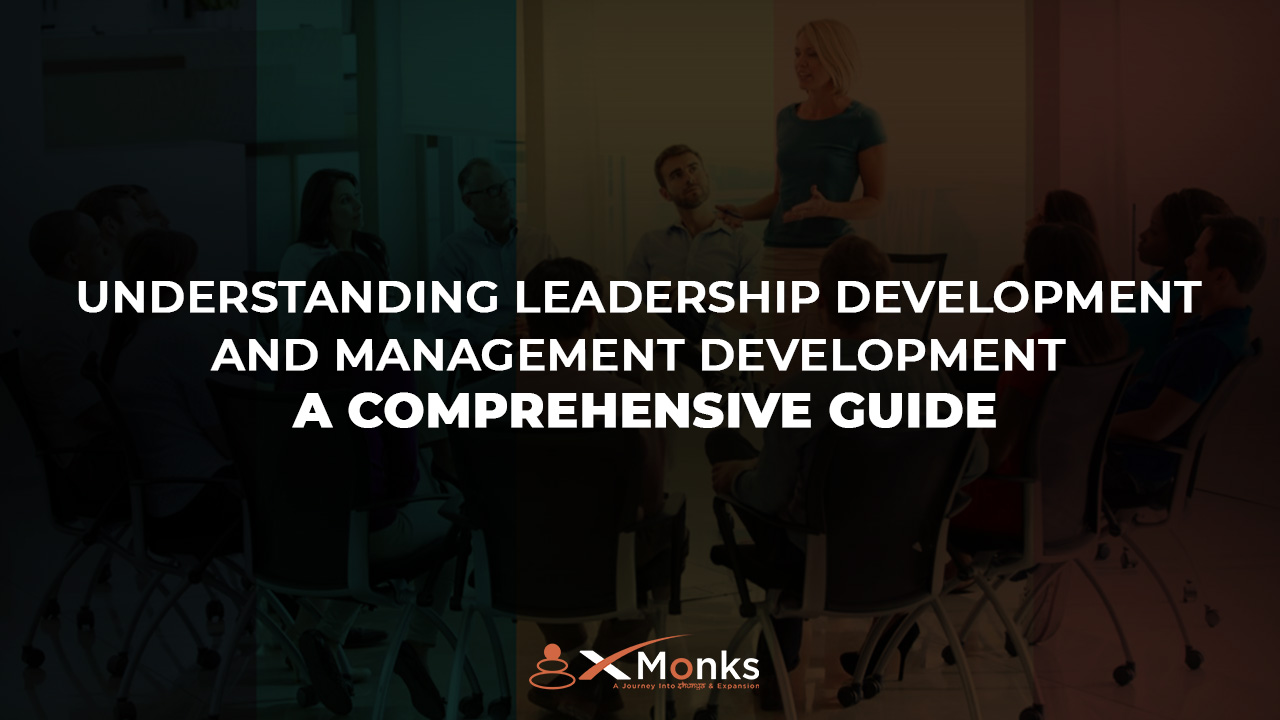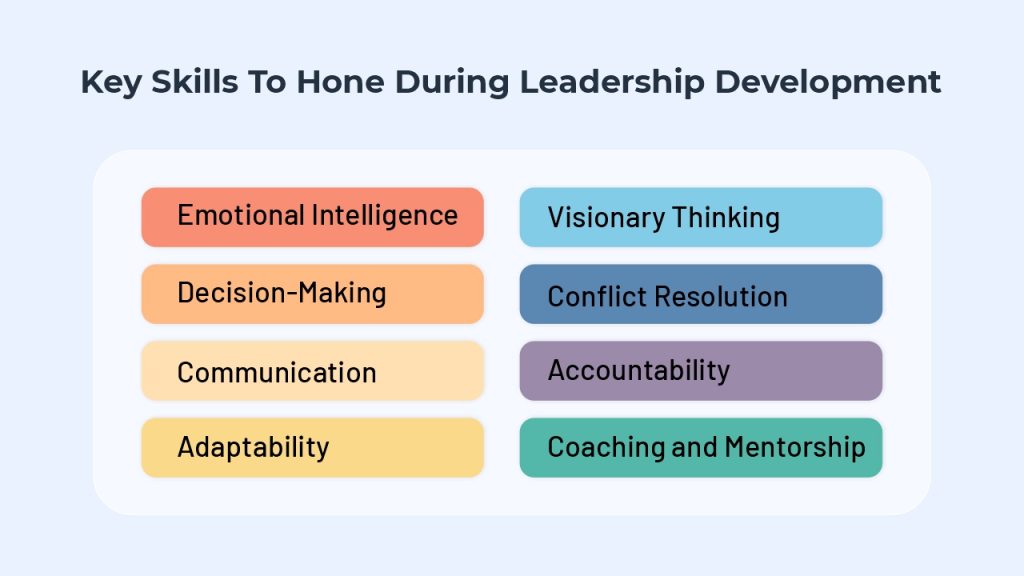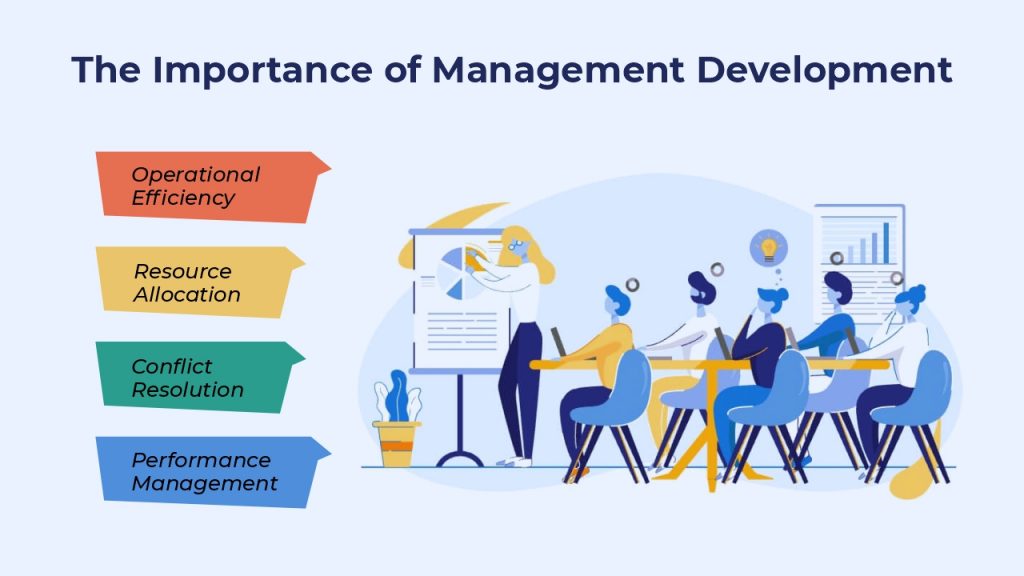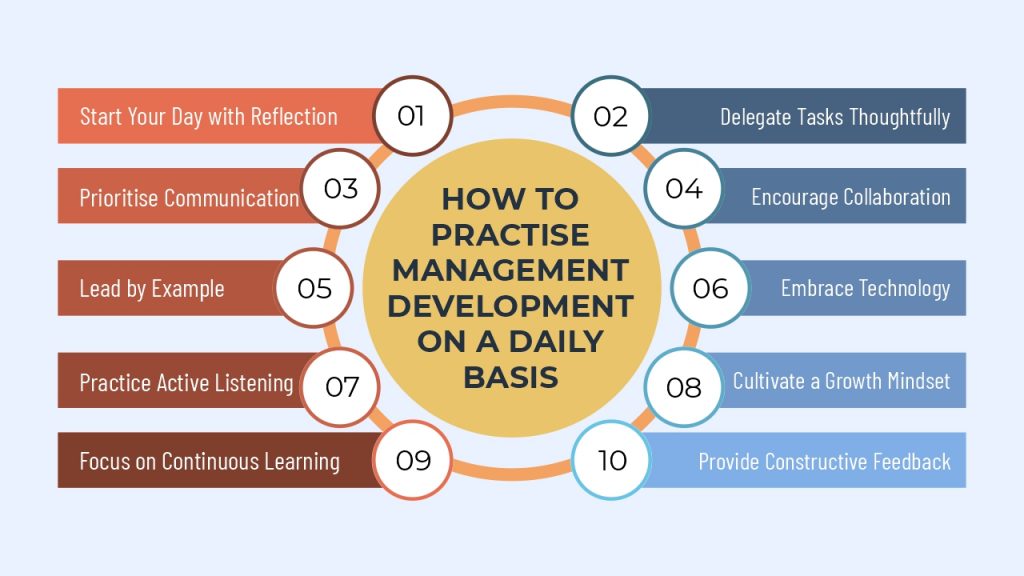Table of Contents
ToggleUnderstanding Leadership Development and Management Development: A Comprehensive Guide

In the whirlwind of today’s ever-shifting business landscape, leadership development and management development stand as pillars of progress. Companies, attuned to the pulse of growth, pour resources into these realms, understanding that the dance of strong leadership and the art of effective management are the keys to unlocking success. Yet, though these terms often intertwine in conversation, they carve out distinct paths on the journey of organisational excellence.
Leadership development shapes visionaries, those who inspire, innovate, and elevate their teams to new heights. It’s about cultivating the inner fire that lights the way forward. Meanwhile, management development hones the skills of those who steer the ship, ensuring that each process and person is aligned toward the common goal.
This exploration delves into the nuances of these twin forces, highlighting their unique roles and shared significance. As we unfold their layers, we uncover how organisations can weave these threads into the fabric of their culture, fostering growth and paving the way for enduring success.
What is Leadership Development?
Leadership development is the process of enhancing an individual’s ability to lead others within an organisation. It involves nurturing the skills, knowledge, and behaviours necessary to inspire, influence, and guide teams toward achieving a common goal. Leadership development is not limited to those in executive roles; it can be applicable to anyone in an organisation who has the potential to lead, regardless of their current position.
Leadership development programs typically focus on areas such as emotional intelligence, decision-making, communication, and strategic thinking. These programs aim to develop leaders who can navigate complex challenges, drive innovation, and create a positive organisational culture.
What is Management Development?
Management development, on the other hand, is the process of improving an individual’s managerial skills. This includes the ability to plan, organise, direct, and control resources effectively to achieve organisational objectives. Management development focuses on the practical aspects of managing people, projects, and processes.
Management development programs often cover topics such as time management, conflict resolution, performance evaluation, and delegation. The goal is to equip managers with the tools they need to handle day-to-day operations efficiently and effectively.
The Differences Between Leadership Development and Management Development
While leadership development and management development share some common goals, such as improving organisational performance, they differ in their focus and approach:
Focus:
- Leadership Development: Emphasises the development of personal qualities that enable an individual to inspire and guide others. It is about creating a vision, motivating people, and fostering innovation.
- Management Development: Focuses on the technical skills required to manage resources, processes, and people. It is about ensuring that tasks are completed efficiently and that the organisation runs smoothly.
Approach:
- Leadership Development: Involves a more holistic approach, often incorporating elements of personal growth, self-awareness, and emotional intelligence. It is about developing the leader as a whole person.
- Management Development: Tends to be more structured and task-oriented, with a focus on specific managerial skills and competencies.
Outcome:
- Leadership Development: Aims to create visionary leaders who can drive change, inspire others, and build a positive organisational culture.
- Management Development: Aims to create effective managers who can handle the practical aspects of running an organisation, such as budgeting, scheduling, and staffing.
The Importance of Leadership Development
Leadership development is crucial for several reasons:
- Driving Innovation: Effective leaders are essential for driving innovation within an organisation. They have the ability to think strategically, take calculated risks, and inspire others to embrace change.
- Building a Positive Culture: Leaders play a key role in shaping the culture of an organisation. A strong leader can create a positive work environment where employees feel valued, motivated, and engaged.
- Succession Planning: Leadership development is essential for succession planning. By nurturing future leaders, organisations can ensure continuity and stability even as key leaders retire or move on.
- Enhancing Employee Engagement: Leaders who are well-developed are more likely to engage and inspire their teams. This leads to higher levels of employee satisfaction, retention, and overall performance.
Key Skills To Hone During Leadership Development

Leadership development is an ongoing journey that requires a combination of innate qualities and learned skills. In the dynamic landscape of modern business, honing specific skills during leadership development can be the difference between a good leader and a great one. This article will delve into the key skills that every aspiring leader should focus on to navigate the challenges of leadership and guide their teams toward success.
1. Emotional Intelligence
One of the most critical skills for any leader is emotional intelligence (EI). This involves the ability to understand and manage your own emotions, as well as recognise and influence the emotions of others. High emotional intelligence helps leaders to build strong relationships, foster a positive work environment, and navigate complex interpersonal dynamics. It allows leaders to respond thoughtfully rather than react impulsively, thus creating a more stable and supportive environment for their teams.
Key Components of Emotional Intelligence:
- Self-Awareness: Understanding your strengths, weaknesses, and emotional triggers.
- Self-Regulation: Controlling impulses and managing emotional reactions.
- Empathy: Recognising and understanding others’ emotions and perspectives.
- Social Skills: Building and maintaining healthy relationships.
2. Decision-Making
Effective decision-making is at the heart of leadership. Leaders are often faced with complex decisions that have far-reaching consequences. The ability to analyse situations, consider various perspectives, and make informed decisions is crucial. This skill involves both strategic thinking and the ability to act decisively, even in the face of uncertainty.
Strategies for Improving Decision-Making:
- Gather Data: Make decisions based on accurate and relevant information.
- Evaluate Options: Weigh the pros and cons of different approaches.
- Seek Input: Consider the insights and opinions of team members and stakeholders.
- Decisiveness: Once a decision is made, commit to it and act swiftly.
3. Communication
Clear and effective communication is essential for any leader. It involves not only conveying ideas and expectations but also listening actively and providing feedback. Strong communication skills help leaders to align their teams with the organisation’s vision, resolve conflicts, and inspire action.
Key Aspects of Effective Communication:
- Clarity: Ensure that messages are clear and easy to understand.
- Active Listening: Pay attention to what others are saying without interrupting.
- Feedback: Provide constructive feedback that helps others improve.
- Adaptability: Tailor communication style to suit different audiences and situations.
4. Adaptability
In today’s rapidly changing business environment, adaptability is a must-have skill for leaders. The ability to adjust to new circumstances, embrace change, and pivot strategies when necessary is crucial for long-term success. Adaptable leaders are resilient, open-minded, and willing to experiment with new approaches.
Developing Adaptability:
- Embrace Change: View change as an opportunity rather than a threat.
- Continuous Learning: Stay curious and open to new information and ideas.
- Flexibility: Be willing to alter plans and strategies when needed.
- Problem-Solving: Approach challenges with a solution-oriented mindset.
5. Visionary Thinking
Leaders need to have a clear vision of where they want to take their organisation. Visionary thinking involves not just setting goals but also inspiring others to work toward them. It requires creativity, foresight, and the ability to see the big picture.
Cultivating Visionary Thinking:
- Strategic Planning: Develop long-term plans that align with the organisation’s mission.
- Inspiration: Motivate your team by sharing your vision and showing how their work contributes to it.
- Innovation: Encourage creativity and experimentation within your team.
- Focus: Keep the team focused on the vision even in the face of challenges.
6. Conflict Resolution
Conflicts are inevitable in any team, but how a leader handles them can make all the difference. Leaders who are skilled in conflict resolution can address issues before they escalate, maintain harmony within the team, and ensure that disagreements lead to productive outcomes.
Effective Conflict Resolution Techniques:
- Open Dialogue: Encourage open communication and address conflicts head-on.
- Mediation: Act as a neutral party to help resolve disputes.
- Negotiation: Find solutions that satisfy all parties involved.
- Emotional Control: Keep emotions in check and approach conflicts calmly and objectively.
7. Accountability
Accountability is about taking responsibility for your actions and decisions, as well as holding others accountable for theirs. Leaders who model accountability create a culture of trust and integrity within their teams.
Building Accountability:
- Lead by Example: Demonstrate accountability in your own actions.
- Set Clear Expectations: Clearly define roles, responsibilities, and outcomes.
- Follow-Up: Monitor progress and hold team members accountable for their contributions.
- Feedback: Provide regular feedback and address any lapses in accountability.
8. Coaching and Mentorship
Leaders are not just responsible for guiding their teams; they are also responsible for developing future leaders. Coaching and mentorship are essential skills for fostering growth, building talent, and ensuring the long-term success of the organisation.
Becoming a Better Coach and Mentor:
- Active Listening: Understand the needs and aspirations of your team members.
- Guidance: Provide direction and advice to help others achieve their goals.
- Encouragement: Motivate and inspire team members to reach their full potential.
- Development: Offer opportunities for professional growth and development.
Leadership development is an ongoing process that requires a commitment to continuous learning and improvement. By honing these key skills—emotional intelligence, decision-making, communication, adaptability, visionary thinking, conflict resolution, accountability, and coaching—leaders can navigate the complexities of leadership and guide their teams toward success. Investing in these skills not only benefits the leader but also fosters a more engaged, productive, and resilient team.
The Importance of Management Development

Management development is equally important for the following reasons:
- Operational Efficiency: Effective management is critical for ensuring that an organisation runs smoothly. Managers are responsible for overseeing day-to-day operations, and their ability to do so effectively has a direct impact on productivity and efficiency.
- Resource Allocation: Managers are responsible for allocating resources, such as time, money, and personnel, to achieve organisational goals. Management development programs help them make informed decisions that maximise resource utilisation.
- Conflict Resolution: Managers often need to mediate conflicts between team members or departments. Management development programs equip them with the skills to handle conflicts in a way that maintains harmony and productivity.
- Performance Management: Managers play a key role in evaluating employee performance and providing feedback. Management development programs help them do this in a way that is constructive and supportive, leading to continuous improvement.
How To Practice Management Development On A Daily Basis

Management development is not a one-time event; it’s an ongoing process that requires consistent effort and application. For managers aspiring to improve their skills and lead their teams effectively, daily practice is essential. This article will explore how to incorporate management development into your everyday routine, ensuring continuous growth and improved team performance.
1. Start Your Day with Reflection
Begin each day with a few moments of reflection. Consider what you want to achieve, the challenges you might face, and how you can apply your management skills to overcome them. Reflection helps you to stay focused on your goals and ensures that you approach the day with intention.
Daily Reflection Techniques:
- Set Intentions: Define what you want to accomplish each day.
- Review Past Experiences: Consider what worked and what didn’t in previous situations.
- Plan Ahead: Think about how you will handle potential challenges.
2. Prioritise Communication
Effective communication is the backbone of good management. Make it a daily habit to communicate clearly and frequently with your team. Whether it’s through team meetings, one-on-one check-ins, or quick updates, regular communication helps to keep everyone aligned and informed.
Daily Communication Practices:
- Morning Meetings: Start the day with a quick team huddle to discuss goals and updates.
- Check-Ins: Have regular one-on-one meetings with team members to discuss their progress and concerns.
- Open-Door Policy: Encourage team members to come to you with questions or issues.
3. Delegate Tasks Thoughtfully
Delegation is a crucial skill for managers. By entrusting your team with responsibilities, you empower them and free up your time to focus on higher-level tasks. Make it a daily practice to delegate tasks that match your team members’ strengths and provide them with opportunities to grow.
Tips for Effective Delegation:
- Match Tasks to Skills: Assign tasks based on each team member’s strengths and development needs.
- Set Clear Expectations: Ensure that the goals, deadlines, and responsibilities are understood.
- Follow Up: Regularly check on progress and offer support as needed.
4. Practise Active Listening
Active listening is key to understanding your team’s needs and concerns. Make it a habit to listen more than you speak, and ensure that your team feels heard and valued. This not only improves communication but also fosters a culture of trust and respect.
Active Listening Techniques:
- Focus on the Speaker: Give your full attention to the person speaking.
- Avoid Interrupting: Let the speaker finish before responding.
- Clarify and Summarise: Repeat back what you’ve heard to ensure understanding.
5. Encourage Collaboration
Collaboration is essential for a high-performing team. Make it a daily priority to foster a collaborative environment where team members feel comfortable sharing ideas and working together. This can lead to more innovative solutions and a stronger team dynamic.
Ways to Foster Collaboration:
- Team Projects: Assign tasks that require team members to work together.
- Brainstorming Sessions: Hold regular sessions where everyone can contribute ideas.
- Peer Feedback: Encourage team members to give constructive feedback to one another.
6. Lead by Example
As a manager, your actions set the tone for your team. Demonstrate the behaviours and attitudes you want to see in your team members. Whether it’s showing up on time, being open to feedback, or handling challenges with grace, leading by example is a powerful way to influence your team.
Daily Leadership Practices:
- Be Punctual: Show that you value time by being punctual to meetings and appointments.
- Stay Positive: Maintain a positive attitude, even in challenging situations.
- Embrace Feedback: Be open to feedback and show a willingness to improve.
7. Focus on Continuous Learning
Management development is a lifelong journey. Dedicate time each day to learn something new, whether it’s a new management technique, industry trend, or a skill that can be learned. This could involve reading an article, watching a short video, or simply reflecting on a recent experience and considering what you could do better next time.
Tips for Continuous Learning:
- Read Daily: Dedicate time each day to read articles, books, or reports relevant to your field.
- Online Courses: Enroll in online courses or webinars that can provide new insights and skills.
- Reflect: Spend a few minutes at the end of each day reflecting on what you’ve learned and how you can apply it.
8. Provide Constructive Feedback
Feedback is a powerful tool for management development. Make it a daily practice to provide constructive feedback to your team members. This helps them to grow and improves the overall performance of the team. Ensure that your feedback is specific, actionable, and delivered in a way that is supportive.
Giving Effective Feedback:
- Be Specific: Focus on specific behaviours or outcomes rather than general comments.
- Be Timely: Provide feedback as soon as possible after the event you are addressing.
- Be Positive: Start with what the person did well before moving on to areas for improvement.
9. Embrace Technology
In today’s digital age, technology plays a crucial role in management development. From project management tools to communication platforms, technology can help you manage your team more effectively. Make it a daily habit to explore new tools and technologies that can streamline your workflow and improve productivity.
Utilising Technology in Management:
- Project Management Tools: Use tools like Asana, Trello, or Monday.com to track tasks and deadlines.
- Communication Platforms: Leverage platforms like Slack or Microsoft Teams for efficient communication.
- Data Analytics: Use analytics tools to track performance and identify areas for improvement.
10. Cultivate a Growth Mindset
A growth mindset is the belief that abilities and intelligence can be developed through dedication and hard work. As a manager, fostering this mindset within yourself and your team can lead to continuous improvement and innovation. Make it a daily practice to challenge your assumptions, seek out new learning opportunities, and encourage your team to do the same.
Developing a Growth Mindset:
- Challenge Yourself: Take on new challenges and view setbacks as opportunities to learn.
- Encourage Experimentation: Allow your team to experiment and learn from their mistakes.
- Celebrate Effort: Recognise and reward effort, not just results.
Practising management development on a daily basis is essential for becoming a more effective and successful manager. By integrating these practices—reflection, communication, delegation, active listening, collaboration, leading by example, continuous learning, feedback, embracing technology, and cultivating a growth mindset—into your daily routine, you can continuously improve your management skills and lead your team to greater success. Remember, management development is not a destination but a journey, and the key to success lies in the consistent application of these principles every day.
Integrating Leadership and Management Development
While leadership development and management development are distinct, they are also complementary. An effective organisation needs both strong leaders and competent managers. Here are some strategies for integrating leadership and management development:
- Combined Programs: Organisations can create programs that integrate both leadership development and management development. These programs can focus on developing the whole person, addressing both the personal qualities needed for leadership and the technical skills required for management.
- Tailored Approaches: Recognise that different individuals may need different types of development. Some may benefit more from leadership development, while others may need a stronger focus on management skills. Tailoring development programs to the needs of each individual can lead to more effective outcomes.
- Mentorship and Coaching: Pairing emerging leaders with experienced mentors or coaches can provide personalised guidance and support. This approach allows for the development of both leadership and management skills in a real-world context.
- Continuous Learning: Encourage continuous learning and development by providing ongoing opportunities for training, workshops, and seminars. This keeps both leadership and management skills sharp and up-to-date.
Case Study: A Successful Integration of Leadership Development and Management Development
Consider a mid-sized technology company that recognised the need to develop both its leadership and management capabilities. The company implemented a comprehensive leadership development program that included the following components:
- Leadership Workshops: The company offered workshops focused on emotional intelligence, strategic thinking, and communication. These workshops were designed to develop the personal qualities needed for effective leadership.
- Management Training: In parallel, the company provided training on project management, budgeting, and conflict resolution. This training was aimed at improving the practical skills needed for effective management.
- Mentorship Program: The company paired emerging leaders with experienced executives who provided mentorship and guidance. This allowed for the development of both leadership and management skills in a real-world context.
- Continuous Development: The company encouraged continuous learning by providing access to online courses, seminars, and conferences. Employees were encouraged to pursue ongoing development in both leadership and management areas.
The result was a more effective and cohesive organisation. Leaders were better equipped to inspire and guide their teams, while managers were more capable of handling the day-to-day operations. The integration of leadership development and management development led to improved performance, higher employee engagement, and a stronger organisational culture.
FAQs
Conclusion
As organisations continue to evolve, the need for effective leadership development and management development will only grow. The challenges of the modern business environment require leaders who can think strategically, inspire others, and drive innovation. At the same time, effective management is essential for ensuring that organisations run smoothly and efficiently.
By investing in both leadership development and management development, organisations can create a balanced approach to growth and success. Whether through combined programs, tailored approaches, mentorship, or continuous learning, the integration of these two areas will be key to building a resilient and thriving organisation.
In the future, we can expect to see even greater emphasis on leadership development and management skills. As technology continues to advance and the business landscape becomes more complex, the ability to lead and manage effectively will be more critical than ever. Organisations that prioritise these areas will be well-positioned to navigate the challenges of the future and achieve long-term success.
By understanding the distinct roles of leadership development and management development, and by integrating these areas effectively, organisations can create a culture of continuous growth and improvement. The result will be a more engaged, motivated, and high-performing workforce, capable of driving innovation and achieving organisational goals.

